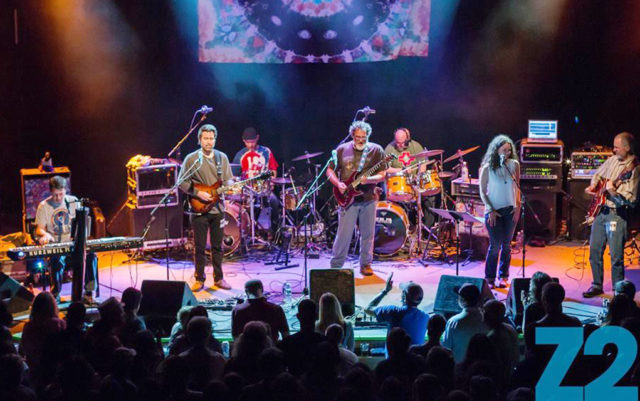
My old buddy Len from Virginia called me on Derby Day last week. Len’s not really a horse racing enthusiast, but he calls me out of the blue from time to time to talk music and work and gaming and whatnot… and on Derby Day, reflect on our mutually enduring appreciation for Secretariat, the great red mare of Triple Crown legend. We used to hang out on a video game forum in the early aughts, and he recalls a Derby Day post he claims I threw out there: a snap of Secretariat in impossibly extended workout stride, the fence posts blurred behind him, captioned simply: “God in a horse suit.”
I don’t remember posting that, but it sounded like me; either way, it’s a small but good thing to be remembered for.
We got to talking about music and I mentioned that I was going to interview Shakedown Street, knowing that Len was a semi-retired Deadhead, and he perked up. “I saw those guys once, can’t remember when… They were good.”
I told him I wouldn’t know how to rate Dead tribute bands, preferring to leave the finer points of interpretative nuance to those better versed in the canon and topology of Dead music, but I did say Shakedown Street was an enduring and gently treasured institution around here. Colorado is fertile ground for the slow generational procession of the Deadhead gestalt.
In some ways, I got the feeling that Len appreciated the trib outfits — Shakedown Street or Dark Star Orchestra — more than the lingering offspring bands staffed by the surviving originals.
“I dunno, man,” he said. “I’ve been out of the scene for awhile. This whole… what is it, Dead and Company or whatever it is, the kids going to these shows weren’t there for the real thing.” He drew a breath, as if lamenting.
I related this exchange to Edwin Hurwitz a day or so later. Hurwitz is Shakedown’s bassist and a longtime Boulder scene player, most recently as Great American Taxi’s first incarnation bassist. Hurwitz migrated from the East Coast in the late ’80s, a founding member of the Boston-based Shockra (Motet majordomo Dave Watts, who preceded Hurwitz westward by about a year, was also in Shockra). Hurwitz would also count himself as a ’70s- era Dead enthusiast, not excessively elitist about his Dead-era preference, but an informed and thoughtful observer of the Dead scene.
He echoes Len’s observation about the generational timeline.
“It’s funny that you bring that up,” he says. “My wife and I have been together for 26 years and she’s 10 years younger than me. She saw a couple of Dead shows back in the ’80s, while most of the shows I saw were in the ’70s, and I had friends with older brothers and sisters who said that by 1972, the whole thing was over.
“So there was a bunch of different generations that came along and had their experience of it, and then it changed, and then they were like, ‘Oh well, everybody behind me kind of missed it.’”
While it isn’t entirely clear, depending on what you read about Shakedown Street, the locally sourced outfit (which got its start from impromptu jam sessions in Manitou Springs) actually began while the Dead were still an ongoing franchise, somewhere around 1987. For anyone keeping score, that would place the band, now long since without any of its original members, at a tenure extending almost as long as the principal.
“It’s kind of nice about the band that, while it’s a Grateful Dead tribute band, everybody does have a voice that they bring to it,” Hurwitz says.
“It’s a band that’s evolved over the years, and I think that someone who saw the band in 1990 or 1995, they’d see the continuity but also see it as a different band.”
The Fox show will feature Arthur Lee Land from Taxi’s current lineup sitting in on rhythm guitar, meaning the band will sound different from even their last Boulder show. A revolving collective, if you will.
But it’s not necessarily a glorified jam. I ask Hurwitz where the outfit, which has largely abandoned out-of-state touring these days, resides on the discipline/loose jam continuum.
“Well, that’s a good question. I’d say there definitely is [a musical discipline at work], in the sense that we play five or six times a month. So it’s not something that sort of pops up while people scramble to figure out what it is that they remember about it,” he says.
“We have our own arrangements and our own approaches to the material we’ve developed as a band. At one point, it was a touring band. I guess you could say it’s a hobby, but it’s really more than that.”
Plus, just like the Dead, the band has cemented itself into its fans lives.
“And I think it’s more than that for the people who come see us. I hesitate to use the phrase ‘community service’, but y’know, there’s still a lot of hunger for that scene, that music and a place for people to get together and have that experience. … I think people in Colorado feel a certain ownership of the band.”
“We keep running into people who say, like, ‘You guys played at our parent,s wedding 20 years ago…’”
We laugh. And I suggest, “Hey, I was conceived after a Shakedown Street show”?
“Don’t laugh; we’ve heard that one, too.”
On the Bill: Shakedown Street. 8:30 p.m. Saturday, May 14, The Fox Theatre, 1135 13 St., Boulder,720-645-2467.














